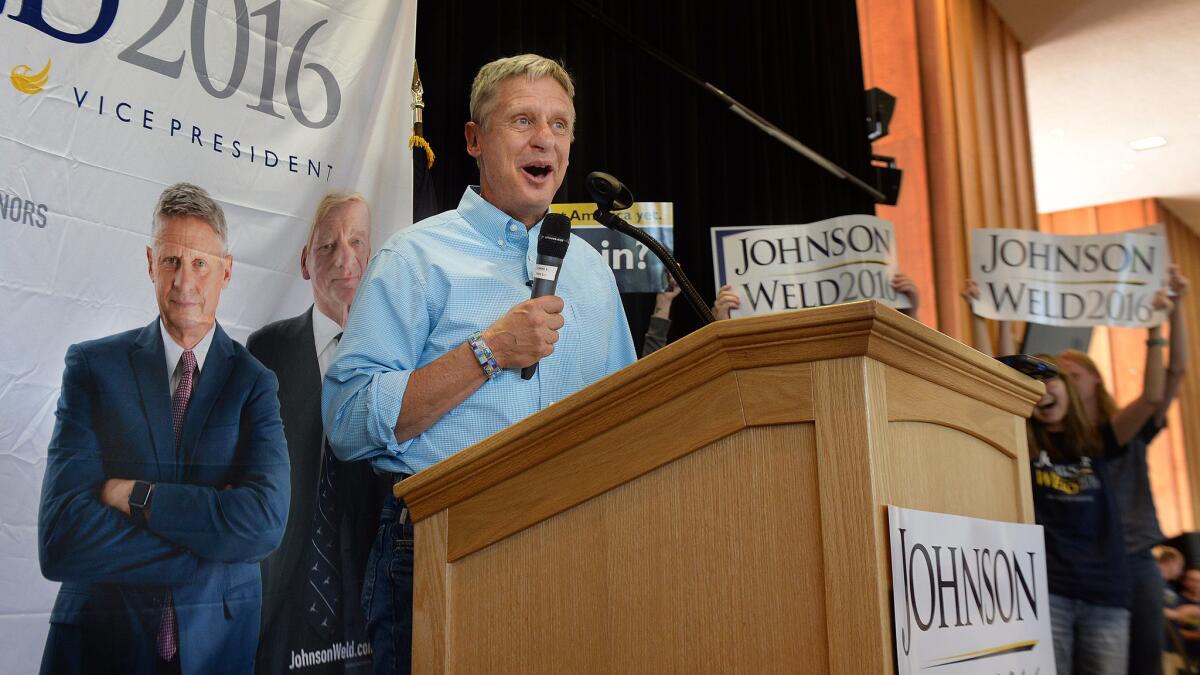Op-Ed: Let Gary Johnson (and Jill Stein) into the debates

When Evan McMullin announced on Monday morning that he would challenge Donald Trump and Hillary Clinton in their quest for the White House, the 40-year-old former CIA operative quickly learned what third-party freakers could have told him decades ago: Running for president isn’t something that you can wake up one morning and just do.
Getting on even one state ballot is a signature-gathering, deadline-maneuvering pain in the posterior. This latest #NeverTrump fantasy had already missed the boat in 26 states before the first official news release, and that number will likely increase to 34 plus Washington, D.C., by the end of the week, as a raft of new filing deadlines turns a protest gesture into a total joke.
Not that getting his ducks in a row would have necessarily made a difference. Better-organized outsiders who complete the necessary drudge work of ballot access, like Libertarian Gary Johnson and the Green Party’s Jill Stein, still face a major pothole on the way to the highest office in the land: debate access.
On Friday, District Court Judge Rosemary Collyer threw out a Libertarian/Green lawsuit alleging that the Commission on Presidential Debates, whose board members are appointed equally from the Republican and Democratic National Committees, violates anti-trust laws and the 1st Amendment by setting an unreasonably high bar for third parties to compete.
As a result, Stein is now effectively hosed, and the only way Johnson can qualify is by vaulting up in the next four weeks or so from around 9% in the polls to the required 15%. Things seem pretty hopeless — unless the debate commission feels political pressure to crack open the duopoly.
There’s a chance that will come to pass.
On Monday, commission co-chair Mike McCurry, the former Bill Clinton White House press secretary, semi-confirmed to Politico that the commission is telling debate venues to make contingency plans for a third podium. “With Gary Johnson polling in some places more than double digits,” McCurry said, “some of our production people may have said, ‘Just in case, you need to plan out what that might look like.’”
The commission’s Republican co-chair, Frank Fahrenkopf Jr., went even further in an interview with CNBC last week. “If someone came in and let’s say he was [polling] at 14.5% and the margin of error in five polls was three points, we are going to have to sit down and look at it,” Fahrenkopf said.
You cannot provide the best possible information [to voters] by limiting the debate to ... the two most disliked presidential nominees in modern history.
The commission and its overlords are right to ponder a tweak to the rules, if for no other reason than to fulfill its stated mission, which reads in part “to ensure that debates, as a permanent part of every general election, provide the best possible information to viewers and listeners.”
You cannot provide the best possible information by limiting the debate to Trump and Clinton — the two most disliked presidential nominees in modern history. Besides, even with our seemingly inevitable two-party sorting process, a full 20% of registered voters consistently indicate that they will not be pulling the lever for either D or R. Johnson and Stein, meanwhile, have combined for the same national polling percentage — just a tick below 13 — both before and after the major-party conventions, suggesting that the traditional halving of third-party polls between summer and election day might not be happening this campaign season.
Just as important, both major-party candidates back policies that are uncommonly extreme in an American context. Trump’s hostility toward the free movement of human beings may get the most ink, but Clinton has embraced an economic agenda arguably to the left of anything we’ve seen since George McGovern, with giant college-tuition giveaways, a major ratchet in the federal minimum wage, expansions to the actuarilly suicidal entitlement state, and a batch of new taxes to magically pay for it all. The last three presidents spent considerable oxygen talking about the urgent need to reform Social Security and Medicare/Medicaid before the Baby Boom generation retires; the next one decidedly will not, unless it’s Johnson.
So what would a fairer debate system look like? The tossed-out lawsuit suggested an elegant solution: If you qualify for enough ballots to have a mathematical possibility of winning the electoral college, you’re in. That would mean Trump and Clinton plus Johnson and Stein: At press time, the Libertarian Party had confirmed access to 39 ballots with an expectation of 51, while the Greens have 27 with the expectation of surpassing 2012’s 37.
Of course, that doesn’t mean Stein and her 4% in the polls will get an automatic 25% of the speaking time, but rather that American voters will at least be exposed to viewpoints and characters they might not loathe.
And the sheer pain of ballot access will ensure that the number of trial balloon candidates will be kept to a minimum. Better luck next time, Evan McMullin.
Matt Welch is editor at large of Reason and a contributing writer to Opinion.
Follow the Opinion section on Twitter @latimesopinion and Facebook
More to Read
A cure for the common opinion
Get thought-provoking perspectives with our weekly newsletter.
You may occasionally receive promotional content from the Los Angeles Times.






